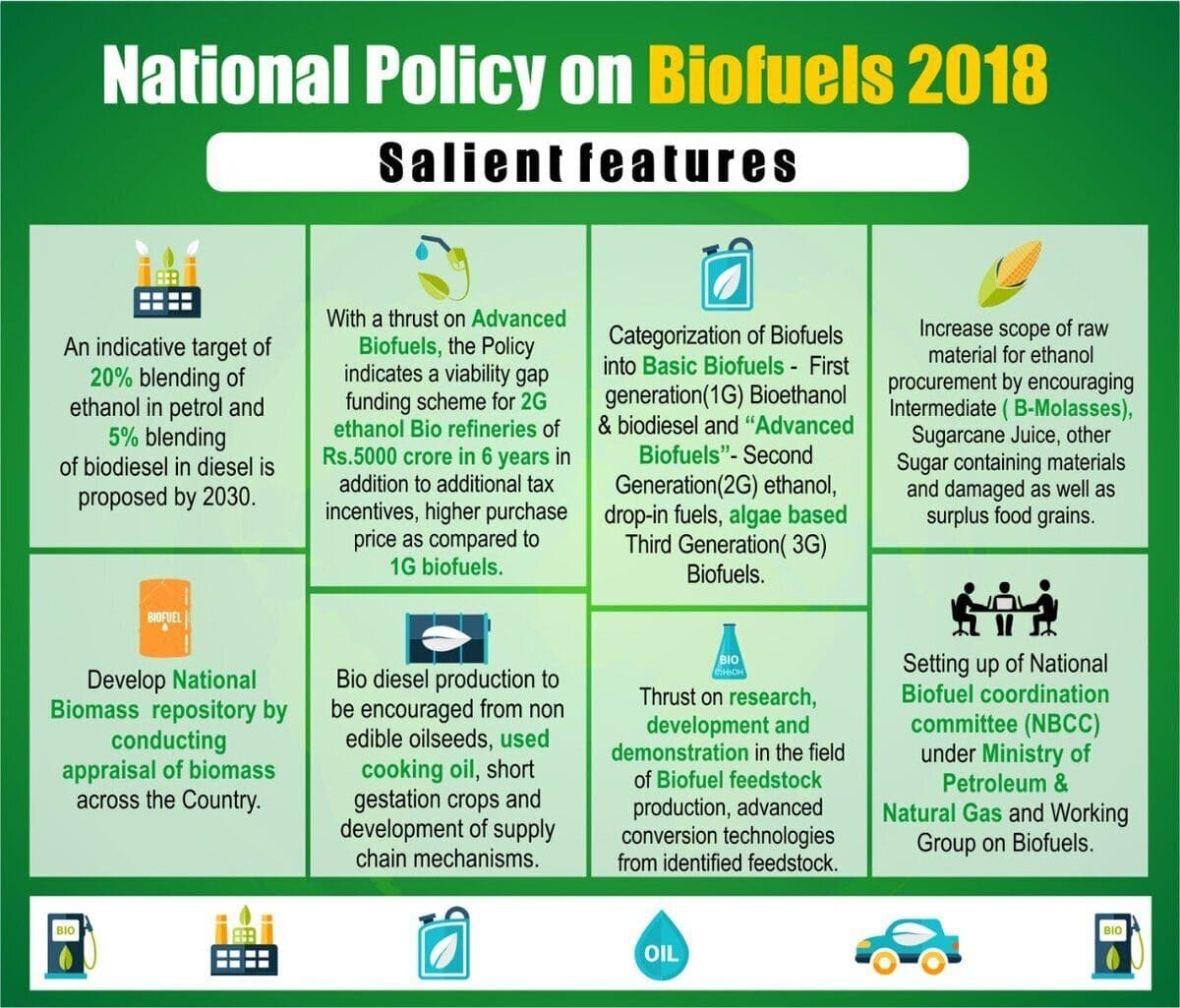National Policy on Biofuels | 19 May 2022
For Prelims: Ethanol Blending, Biofuels, Crude oil, 2018 National Policy on Biofuels
For Mains: Ethanol Blending and its significance
Why in News?
Recently, the Union Cabinet approved amendments to the National Policy on Biofuels, 2018.
What are the Key Amendments approved?
- More Feedstocks:
- One of the amendments is that the government will allow more feedstocks for the production of biofuels.
- Ethanol Blending Target:
- Instead of 2030, the Centre plans to move ahead with its ethanol blending target of 20% of petrol containing ethanol by 2025-26.
- It will promote the production of biofuels in the country, under the Make in India program, by units located in Special Economic Zones (SEZ)/ Export Oriented Units (EoUs).
- New members to the NBCC:
- The government has allowed the addition of new members to the National Biofuel Coordination Committee (NBCC).
- NBCC was constituted under the Chairmanship of Minister, Petroleum & Natural Gas (P&NG) to provide overall coordination, effective end-to-end implementation and monitoring of biofuel programme.
- NBCC has members from 14 other ministries.
- The government has allowed the addition of new members to the National Biofuel Coordination Committee (NBCC).
- Export of Biofuels:
- Permission will be granted for the export of biofuels in specific cases.
What is the Significance of the Amendments?
- Boost Make in India Drive:
- The proposed amendments are expected to pave the way for the Make in India drive thereby leading to a reduction in the import of petroleum products by the generation of more and more biofuels.
- Promote the Atmanirbhar Bharat Initiative:
- Since many more feedstocks are being allowed for the production of biofuels, this will promote the Atmanirbhar Bharat and give an impetus to the Prime Minister’s vision of India becoming 'energy independent' by 2047.
- Generate More Employment:
- Also, the proposed amendments are expected to attract and foster developments of indigenous technologies which will pave the way for the Make in India drive and thereby generate more employment.
What is the National Policy on Biofuels, 2018?
- About:
- The “National Policy on Biofuels was notified by the Ministry of Petroleum and Natural Gas in 2018.
- The policy was notified in supersession of the National Policy on Biofuels, promulgated through the Ministry of New & Renewable Energy, in 2009.
- Categorisation:
- The Policy categorises biofuels as
- "Basic Biofuels" viz. First Generation (1G) bioethanol & biodiesel and "Advanced Biofuels".
- “Advance Biofules” viz. Second Generation (2G) ethanol, Municipal Solid Waste (MSW) to drop-in fuels.
- Third Generation (3G) biofuels, bio-CNG etc. to enable extension of appropriate financial and fiscal incentives under each category.
- The Policy categorises biofuels as
- Features:
- It expands the scope of raw material for ethanol production by allowing use of sugarcane juice, sugar containing materials like sugar beet, sweet sorghum, starch containing materials like corn, cassava, damaged food grains like wheat, broken rice, rotten potatoes, unfit for human consumption for ethanol production.
- The Policy allows use of surplus food grains for production of ethanol for blending with petrol with the approval of National Biofuel Coordination Committee.
- With a thrust on Advanced Biofuels, the Policy indicates a viability gap funding scheme for 2G ethanol Bio refineries of Rs. 5000 crore in 6 years in addition to additional tax incentives, higher purchase price as compared to 1G biofuels.
What are the Related Initiatives?
- Ethanol Blended Petrol (EBP) programme
- It seeks to achieve blending of Ethanol with a view to reducing pollution, conserve foreign exchange and increase value addition in the sugar industry enabling them to clear cane price arrears of farmers.
- Pradhan Mantri JI-VAN Yojana, 2019
- To create an ecosystem for setting up commercial projects and to boost Research and Development in 2G Ethanol sector.
- GOBAR (Galvanizing Organic Bio-Agro Resources) DHAN scheme
- It focuses on managing and converting cattle dung and solid waste in farms to useful compost, biogas and bio-CNG, thus keeping villages clean and increasing the income of rural households.
- Repurpose Used Cooking Oil (RUCO)
- It was launched by Food Safety and Standards Authority of India (FSSAI) and aims for an ecosystem that will enable the collection and conversion of used cooking oil to biodiesel.
UPSC Civil Services Examination, Previous Years Questions (PYQs)
Q. According to India’s National Policy on Biofuels, which of the following can be used as raw materials for the production of biofuels? (2020)
- Cassava
- Damaged wheat grains
- Groundnut seeds
- Horse gram
- Rotten potatoes
- Sugar beet
Select the correct answer using the code given below:
(a) 1, 2, 5 and 6 only
(b) 1, 3, 4 and 6 only
(c) 2, 3, 4 and 5 only
(d) 1, 2, 3, 4, 5 and 6
Ans: (a)
- The National Policy on Biofuels, 2018, allows production of ethanol from damaged food grains like wheat, broken rice, etc., which are unfit for human consumption.
- The Policy also allows conversion of surplus quantities of food grains to ethanol, based on the approval of the National Biofuel Coordination Committee.
- The Policy expands the scope of raw material for ethanol production by allowing use of sugarcane juice, sugar containing materials like sugar beet, sweet sorghum, starch containing materials like corn, cassava, damaged food grains like wheat, broken rice, rotten potatoes, unfit for human consumption for ethanol production. Hence, 1, 2, 5 and 6 are correct. Therefore, option (a) is the correct answer.

